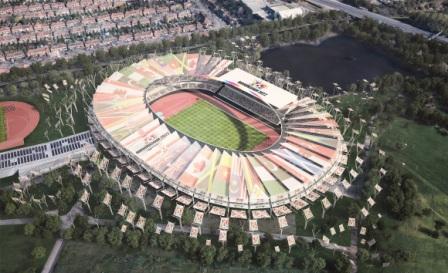Birmingham seeking professional football or rugby team for revamped Alexander Stadium.

Organisers of Birmingham’s 2022 Commonwealth Games bid are seeking a professional football or rugby team as anchor tenants for the Alexander Stadium in Perry Barr as plans for the centrepiece of the city’s Games bid appear to be undergoing a radical re-think.
In June Birmingham announced that the stadium, where both the 2022 opening and closing ceremonies, along with the track and field athletics, would take place, was to be transformed into a temporary 40,000 capacity venue for the Games, before subsequently being reduced to a permanent 25,000 (maximum) seats. Organisers of Birmingham’s bid had then envisaged the stadium becoming the home of British athletics with no mention made of an anchor tenant beyond Birchfield Harriers athletics club, who have been based there since the stadium opened in 1978.
However, it has become increasingly clear that despite UK Athletics – the sport’s governing body – being based at the Alexander Stadium, nearly all major British outdoor athletics events are likely in future to be staged at the London Stadium, home to the 2012 Olympics, where the sport’s governing body have an annual three-month tenancy agreement lasting beyond 2060.
Birmingham currently hosts the National Trials and a Diamond League event, but whilst the future of the Trials is considered secure (it occurs outside the period of UK Athletics’ London Stadium tenancy), the Birmingham Diamond League meeting’s future is less certain, with the Alexander Stadium’s contract to host the event currently set to expire after 2019, and with the governing body having expressed a desire to stage a Diamond League finals meet in London.
Assuming that neither Aston Villa nor Birmingham City might be tempted to relocate to Perry Barr, the most likely anchor tenant from the world of football would seem to Birmingham City Ladies, currently playing at Solihull Moors’ Damson Park ground close to Birmingham Airport. Less likely are the Moors themselves, formed in 2007 from the merger of Moor Green FC and Solihull Borough FC, but who have since struggled to attract both spectators and to retain their place in the National League, the fifth tier of English football.
Aston Villa Ladies might also be on the Council’s list. Although not currently professional, the club have developed steadily in recent years to the point where promotion to the Women’s Super League 2 is a real possibility. And whilst none of these three would attract more than a couple of thousand spectators, they would provide the rebuilt stadium with an important role in supporting grass roots sport beyond athletics.
Turning to rugby, with the Moseley club seemingly happily ensconced at Billesley Common, where they have developed an impressive array of community pitches and other facilities over the past dozen years or so, the Council might be considering replicating the situation in Coventry, where Wasps transferred from Wycombe to the city’s Ricoh Arena, developing a large spectator base whilst also enhancing their playing side.
Meanwhile, background notes pertaining to a recent article on the Council’s Birmingham Newsroom website showed plans for the Alexander Stadium appear to have been downsized by 5,000 seats to a maximum capacity of 20,000 with the stadium now described as a multi-sport venue. And whilst any successful Games bid would still see the Alexander Stadium considerably enhance its athletics facilities, there are reports that the Council is also seeking to attract concerts and conferences to the stadium as part of its post-Games legacy.
That such a crucial component of Birmingham’s Commonwealth Games proposals seems to be undergoing a substantial change just weeks before the Department for Digital, Culture, Media and Sport decide between the city and Liverpool does not augur well. Meanwhile, the ongoing failure to publicly confirm definite locations for track cycling, tennis and swimming, as well as the location of the athletes’ village, perhaps indicates that the city is struggling to finalise key aspects of its plans.
The absence of public support from Council Leader John Clancy (we have not yet read or heard any supportive comments from him concerning the bid) is also becoming increasingly noticeable, particularly given the work that Deputy Council Leader Ian Ward, Chairman of the Birmingham Commonwealth Games Bid Company, is putting in to try and bring the Games to Birmingham.
